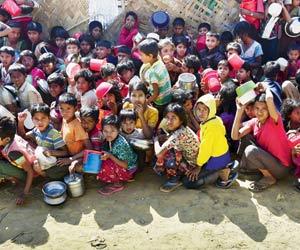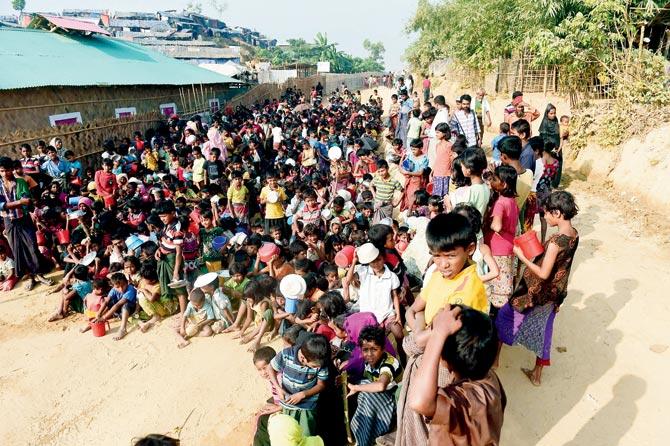Bangladesh has provided Myanmar with a list of over 8,000 Rohingya refugees and has asked the latter to have their backgrounds checked before the repatriation process begins, its home ministry said on Saturday

 Rohingya Refugees
Rohingya Refugees
Bangladesh has provided Myanmar with a list of over 8,000 Rohingya refugees and has asked the latter to have their backgrounds checked before the repatriation process begins, its home ministry said on Saturday.
ADVERTISEMENT
The list of 8,032 refugees from 1,673 households was handed over to Myanmarese Home Affairs Minister Lieutenant General Kyaw Swe by his Bangladeshi counterpart Asaduzzaman Khan during a bilateral meeting at the home ministry office in Dhaka on Friday.
The first group of the refugees on the list will be repatriated once their identity and their residence in Myanmar have been verified by the authorities, The Irrawaddy reported.
Myanmar¿s Home Affairs Ministry urged Bangladesh to investigate and provide information about a list of suspected members of the Arakan Rohingya Salvation Army (ARSA), the Rohingya militant group.
It said the two countries also discussed the pending launch of liaison offices in Myanmar¿s Maungdaw Township and Bangladesh¿s Cox¿s Bazar to coordinate security and combat the cross-border trade of illegal drugs.
U. Thein Swe, the Myanmarese Minister of Labour, Immigration and Population said on Monday that Myanmar would check that the listed refugees had resided in Myanmar within a week and then inform Bangladesh to start the repatriation.
Last month, Bangladesh and Myanmar have agreed on a two-year timeframe for the repatriation of hundreds of thousands of Rohingya refugees.
The process, which was supposed to start from January 22 was delayed as some critics of the deal voiced concerns over the lack of security guarantees for those who would return.
Despite the ongoing preparations for repatriation, more than 2,500 Rohingyas have crossed into Bangladesh this year. According to government statistics, an average of 75 Rohingya refugees fled their villages in Myanmar every day between January 1 and February 15.
Rohingyas are a Muslim minority ethnic group in Myanmar. They have been regarded by many majority Buddhists as illegal migrants from Bangladesh.
There are more than 3,00,000 Rohingyas living in Bangladesh, who fled in earlier waves of violence from the Myanmarese Government since the last three decades.
The United Nations has called the violence against civilians 'ethnic cleansing', but the Myanmarese Government rejected the claims.
A year earlier, India was the 28th worst country among 184 nations in terms of neonatal mortality.
The first 28 days of life - the neonatal period - are the most vulnerable time for a child's survival. Children face the highest risk of dying in their first month of life, at a global rate of 19 deaths per 1,000 live births.
Globally, 2.6 million children died in the first month of life in 2016 most of which occurred in the first week, with about one million dying on the first day and close to one million dying within the next six days, as per the Unicef.
"Among those children, more than 80 per cent died from preventable and treatable causes such as premature birth, complications during delivery, and infections like sepsis and pneumonia," says the UN children's agency.
Affordable and quality healthcare solutions should be there for every mother and newborn. It includes steady supply of clean water and electricity at health facilities, presence of a skilled health attendant during birth, disinfecting the umbilical cord, breastfeeding within the first hour after birth and skin-to-skin contact between the mother and child, it said.
"India is currently off-track to meet the SDG (Sustainable Development Goal) target for neonatal mortality of 12 by 2030," said the report. However, the country has made impressive progress in reduction of under-five mortality and with the current rate of decline "is on track to meet the SDG target for the under-five mortality of 25 per 1000 live births by 2030."
India registered a reduction of 66 per cent in under-five deaths during 1990 to 2015, nearly meeting its Millennium Development Goal (MDG) target. In comparison, the decline in under-five mortality for the world was 55 per cent.
The recent progress is even better, with 120,000 fewer deaths in 2016 as compared to 2015. The number of annual under-five deaths in India has gone below one million for the first time in 2016, said the agency.
On the policy front, introduction of conditional cash transfers, provision of free transport services - 102 and 108 - and making free healthcare an entitlement for every women and infant have led to doubling of institutional deliveries from 39 per cent in 2005 to 79 per cent in 2016.
However, the progress has been inequitable for girls, with under-five mortality rate for girls being at 41 per 1,000 as against 37 per 1000 for boys. India is the only big country in the world to have a higher mortality for girls as compared to boys, it said and added girls are biologically stronger but socially vulnerable in India.
Catch up on all the latest Crime, National, International and Hatke news here. Also download the new mid-day Android and iOS apps to get latest updates
This story has been sourced from a third party syndicated feed, agencies. Mid-day accepts no responsibility or liability for its dependability, trustworthiness, reliability and data of the text. Mid-day management/mid-day.com reserves the sole right to alter, delete or remove (without notice) the content in its absolute discretion for any reason whatsoever
 Subscribe today by clicking the link and stay updated with the latest news!" Click here!
Subscribe today by clicking the link and stay updated with the latest news!" Click here!







